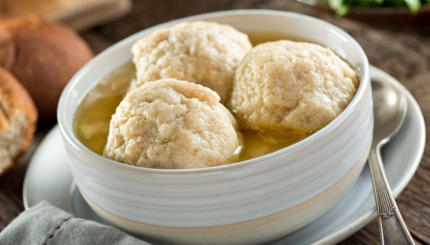Once an animal considered acceptable for consumption has been slaughtered according to the prescribed method, there is still more to be done before the meat is considered and fit to eat. This article covers only some of the provisions of the law in this area; additional details may be found in Rabbi Appel’s book and other written sources, but questions about specific instances should be directed to a competent rabbinic authority. It should be noted that in many cases kosher butchers have already done the salting and soaking required before meat is sold to a consumer. Reprinted, with permission from Ktav Publishing, from The Concise Code of Jewish Law, Volume 1.
Prohibition of Eating Blood
1. The blood of cattle, beasts, and fowl, whether of a clean or an unclean species, is forbidden, as it is written, “Therefore I said unto the children of Israel: No soul of you shall eat blood… Ye shall not eat the blood of any flesh… Whosoever eateth it shall be cut off” (Leviticus 17:12, 14). Apart from removing the veins and blood vessels, the blood must also be extracted from the meat through salting or broiling, as will be explained later.
Salting and Soaking of Meat
1. It is forbidden to cook meat that has not been koshered by salting it and drawing out the blood. However, before the meat is salted it must be thoroughly rinsed with water, and soaked entirely submerged in water for half an hour. All blood that is visible should be washed off the meat. In the case of fowl, the place where the incision was made in slaughtering it should be washed, and any blood visible inside the fowl must also be washed away. Lumps of coagulated blood resulting from a wound, that are sometimes found in cattle and fowl, must be cut away and removed before the meat is soaked. If the water is very cold, it should first be put in a warm place to take the chill out before the meat is soaked in it, because the cold water would harden the meat and the salt would then fail to draw out the blood.
2. If one forgot and allowed the meat to soak for twenty-four hours, the meat as well as the vessel in which it was soaked are forbidden and must not be used. If liver is soaked in water for twenty-four hours, a competent authority should be consulted.

Help us keep Jewish knowledge accessible to millions of people around the world.
Your donation to My Jewish Learning fuels endless journeys of Jewish discovery. With your help, My Jewish Learning can continue to provide nonstop opportunities for learning, connection and growth.
3. On the eve of the Sabbath when there is not enough time, or on another occasion when one is pressed for time, it is sufficient to wash the meat thoroughly and to let it soak in water for a while, and when the water is clear of blood the meat may be salted.
4. If, after the soaking, a piece of meat is cut in two, the place of the incision must be thoroughly washed in order to rinse off any blood that may be there
5. Meat that is frozen must be thawed out before it is salted, but it should not be placed near a hot stove. In a case of emergency it may be soaked in lukewarm water.
6. The vessel that is used for soaking meat must not be used for any other purpose in connection with food.
7. After the meat has been soaked, the water must be drained off so that the salt will not be dissolved by the water and be ineffective in drawing out the blood. The meat should not be left to dry completely, so that the salt will not fall off.
8. The salt should not be as fine-grained as flour, because it would then immediately dissolve and fail to draw out the blood. Nor should it be too coarse, as it would then drop off the meat. The salt should be of medium size, and it should be dry so that it may be spread thoroughly over the meat.
9. The salt should be sprinkled on all sides of the meat so that no place is left unsalted. Poultry must therefore be properly opened so that it may be thoroughly salted on the inside as well.
10. The meat should remain in salt for one hour. In a case of emergency, it is sufficient for it to remain in salt for 24 minutes.
11. The meat that has been salted must be placed where the blood can readily drain off. Therefore, the draining basket should not be placed on the ground, because the blood will not be able to flow off easily. Even after the meat has remained in salt for the required period of time but has not yet been washed, it should not be placed where the blood cannot continue to flow freely. The draining board should be placed in a slanting position so that the blood will flow down freely. The board should not have any cavity where the briny fluid will accumulate. When salting poultry or the whole side of beef, it should be placed with the hollow part turned downward so that the blood may flow off freely.
12. After the meat has remained in salt for the required length of time, the salt should be shaken off well and the meat thoroughly washed off three times so that no blood remains. Meat which had been salted should not be placed in a vessel containing no water before it is washed off.
13. Meat which has not yet been washed should not be placed where there may be some salt there at times. A special vessel should be set aside for meat that has not yet been soaked and salted, and the vessel should not be used for vegetables or fruit or for any other food that is generally eaten without first being washed, as the blood from the meat will adhere to the vessel and then get on to the food.
14. Since the liver contains a great amount of blood, salting does not suffice, but it must be properly cut open across its length and width and placed with the rent part downward over the fire, so that the fire will draw out all of the blood. Before it is placed over the fire, the liver is washed and, when set for broiling, lightly salted. It must be broiled until it is edible, and then washed three times so that the blood is rinsed off. After that it may be cooked, if so desired.
15. Care should be taken to broil the liver over a flame and not in an oven from which the coals have been removed. The liver may not be broiled while wrapped in foil or paper of any kind, no matter how thin.
16. Liver must not be salted before it is broiled in the manner in which meat is salted, and it certainly should not be salted together with meat.
17. Meat that was kept for three full days (72 hours) and had not been soaked within that period of time, may not be cooked but must be broiled.
 3. On the eve of the Sabbath when there is not enough time, or on another occasion when one is pressed for time, it is sufficient to wash the meat thoroughly and to let it soak in water for a while, and when the water is clear of blood the meat may be salted.
3. On the eve of the Sabbath when there is not enough time, or on another occasion when one is pressed for time, it is sufficient to wash the meat thoroughly and to let it soak in water for a while, and when the water is clear of blood the meat may be salted.

